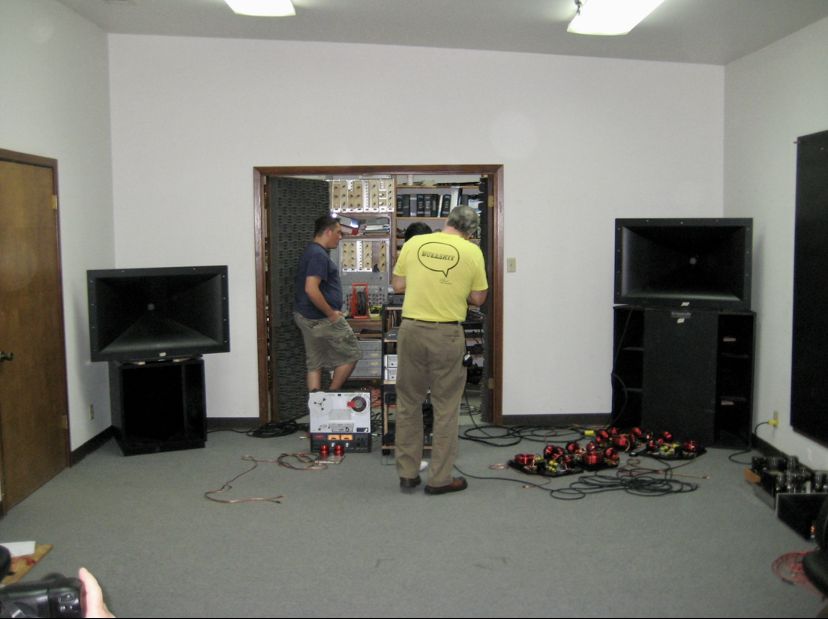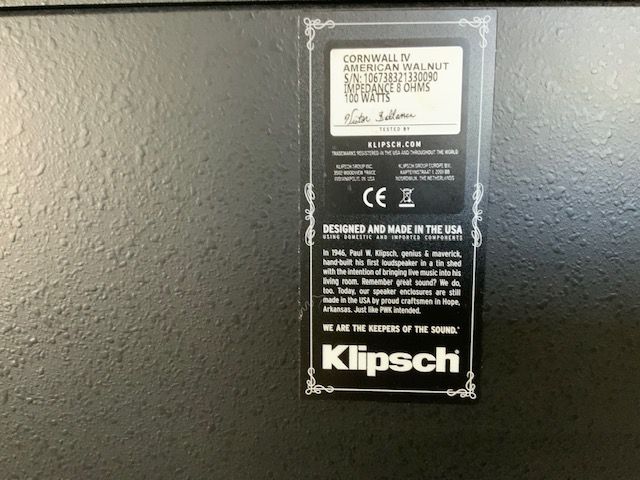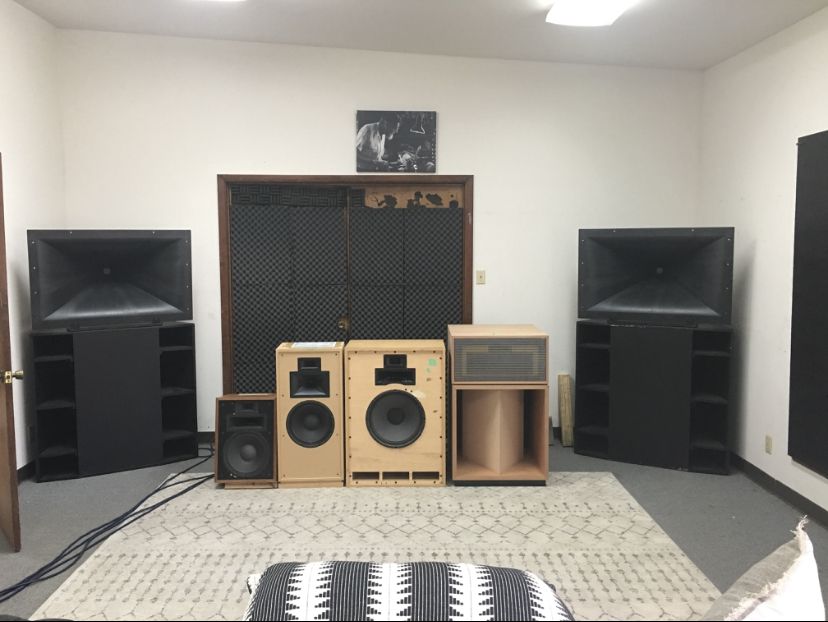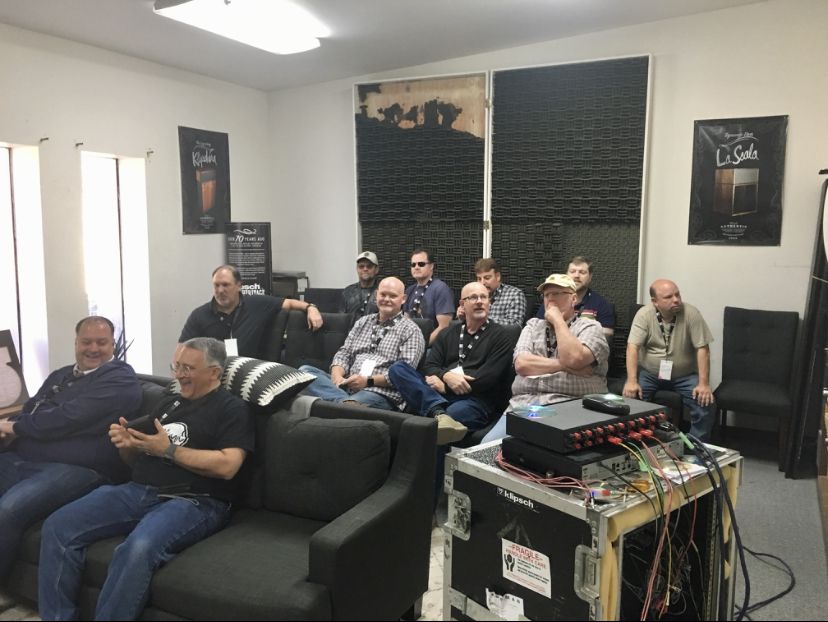-
Posts
4825 -
Joined
-
Days Won
1
Content Type
Forums
Events
Gallery
Everything posted by mikebse2a3
-

Heresy II Signature Series Speaker Question
mikebse2a3 replied to RickFL's topic in General Klipsch Info
I don’t believe that is PWK’s initials on the P. R. I. D. E. Label since it is missing the W of PWK and is instead was just the person in the sanding department for this pair. -
Maybe it was “Dang that K402 sounds good on everything”…. 😀
-
-
FYI….. for anyone interested in these Cornwall IV Jim @c5vette is a long time friend of mine and a serious collector of vintage audio equipment and is a very reliable person to deal with..!!! I offered to post some pictures of his Cornwall IV to help him out so if you have any questions just contact Jim @c5vette and I’m sure he will gladly try to answer them for you. miketn
-
You should add a “Swamping Resistor” just for laughs…… 🤛🤣
-
Good example of the Free Enterprise System at work wouldn’t you say…..? 🙂 Heck have you heard of these people using Klipschorns for 40 years or more and then selling them for twice what they paid for them…? 😄 Bottom line sellers and buyers are free to determine the worth of something and product quality and availability always also plays a part in these things. miketn
-
Gotcha 👍🙂
-
Dang windows and doors…. Always screwing with our setups.. 😀
-
I would be very tempted to try just going phantom center if possible. miketn
-
Michael I’m curious about your room/setup and I believe you said the room was about 13ft x 17ft and in a picture you posted of the rear of the room I believe it looks like that was a 13ft wall. So for clarity are you going to place the Jubilees on the 13ft wall or can you also use the 17ft wall if necessary…?
-
Michael I have listened to my La Scala AL5 in a relative near field setup (approximately 7ft to 8ft and didn’t feel like I was to close in that setup. You might also remember during this Chief Bonehead class we were close to all the loudspeakers in the comparison and the La Scala AL5 was as acoustically coherent as the other models at the same distances in my opinion anyway. miketn🙂
-
Congratulations Michael and please post lots of pictures for us…👍😀 The Heritage Jubilee has been a long time coming and I’m so excited for PWK and Roy and the fortunate ones who will own them that this has come to pass and with such amazing advancements in sound reproduction technology resulting in a truly astounding reference standard in sound reproduction IMHO….!!!! I hope Michael receives as much pleasure and enjoyed the journey with his Heritage Jubilee as I have since I received my Underground Jubilee on August-8-2006 and the journey they have taken me on since then. 🙂 miketn
-
I pray peace and comfort for her family and love ones…. miketn
-
Its not about being “butt hurt” @Shakeydeal it’s about “Keeping an open mind is mandatory” statement yet he looked at McIntosh owners in somewhat the same way as others look at those who believe in cable differences and this goes on all the time in all aspects of our Audio Reproduction Hobby. It’s easy to recognize closed and assuming minds when its directed toward your beliefs/experiences in some way yet so easy to not recognize when we are doing it towards another person’s beliefs/experiences. miketn
-
Dam what a fool I’ve been …… !!! thinking I bought my McIntosh C50 because it has important features and great build quality and that I believe it provided great sound reproduction and to find out instead that “although it isn’t bad” it was about “status symbol” and to “impress guest”. miketn 👍🤪
-
Funny people get this wrong all the time…. The reason some cables will have a direction indicator is to let you know which end of the cable has the shield connected to signal ground so you know to use that end on the low impedance output source when driving the next components input for best external noise rejection. miketn
-
How so…? And what does that have to do with the venting operation example I was trying to clarify…? miketn🙂
-
If you look closer you will see this mod doesn’t share anything with the New Jubilee since the ports mod are loaded directly by the room while the New Jubilee ports are actually horn loaded and then the horn is coupled to the room this is what is unique and why Roy was able to patent the concept. This mod is actually close in concept to past designs such as Altec A7 for example. miketn
-
I’m personally not concerned due to knowing that these are high quality and relatively simple designs with low parts counts and Nelson Pass knows very well how to spec parts and choose operating parameters for very reliable long life span designs. I’m not aware of any issues of getting parts for repair service being reported by First Watt and if anyone is concerned about available parts (I believe they maintain a reserve inventory just in case a need for servicing might arise) for servicing of a First Watt Amplifier I would suggest contacting them directly. I’ve only read of one instance of a First Watt F3 amplifier that needed a solder joint on the Jfet of an F3 reflowed. I’ve not read of any other repairs being required on a First Watt amplifier and would be curious if anyone else knows of any that required service. miketn
-
This is easily solved by using a high quality Jensen ISO-MAX transformer to allow Balanced to Unbalanced equipment use with full high quality signal integrity in my experience. I highly recommend using a Jensen PC-2XR or the PI-2XX (which can be ordered as a PI-2XR if wanting the RCA OUTPUT Connector installed on unit versus using a short Balanced to RCA interconnect cable with the PI-2XX). The PC-2XR has a 4:1 Step-down Transformer and is beneficial in situations where you have to much gain in the system leading to the amplifier or an amplifier with a high sensitivity input. The PI-2XX (PI-2XR) has a 1:1 Transformer and is best used when the system gain isn’t an issue or in the specific case with amplifiers having typical or low input sensitivity. The First Watt F3 for example will work well with either but my preference and my opinion having used both ISO-MAX units is the F3 benefits from strong input drive and gives maximum quality and output level when using my McIntosh C50 with the PI-2XX (with the proper balanced to unbalanced adapter cable). On the topic of warm up with the first watt amplifiers I have experienced the same as you in that the imaging and tonal balance of the F3 takes a minimum of 30 minutes to 1 hour to fully develop and stabilize and is easily among the best I have experienced even when compared with my Cary CAD2A3-SE tube amplifiers. FYI: I have actually measured both of my F3 amplifier’s heat sinks and temperature stability is reached at 130 Degree Fahrenheit in approximately 1hr. miketn
-
Perhaps… but the adds only state “Asking Price” and no where do I see actual sold price. Also who knows if he actually received payment through PayPal or how he was paid. I’ve already wasted more time than I care to on this but after checking it out a little deeper I see that the Buyer of the Klipschorns also made a combined deal for a Tube Amplifier along with the Klipschorns so who knows what kind of deal the Buyer/Seller ultimately made as far as actual dollars exchanged, actual method of payment and how much was IRS reportable. The way I see it only the Buyer/Seller know what the final deal was and to assume it all went for “Asking Price” and was completed through “PayPal” isn’t justified at this point and could be misleading unless you have actual firsthand knowledge. miketn
-
My question was how did you know since you stated it as a fact in your posting…? ”extreme curiosity” now thats funny 😆 miketn
-
Just curious but how do you know what they actually sold for….? Is it verified/recorded somewhere on the website..?
-
I can assure you that some amplifiers like the First Watt F3 takes from 30 minutes to an hour (yes I have measured this)to reach a stable temperature and this is very audible as a shift in tonal balance, clarity and imaging especially.. IMHO the F3 is one of the best amplifiers within its power range once it reaches its stable operating temperature. miketn






















